- Home
- Arthur Conan Doyle
The Man from Archangel, and Other Tales of Adventure Page 3
The Man from Archangel, and Other Tales of Adventure Read online
Page 3
III
BORROWED SCENES
"It cannot be done. People really would not stand it. I know because I have tried."--_Extract from an unpublished paper upon George Borrow and his writings._
Yes, I tried and my experience may interest other people. You mustimagine, then, that I am soaked in George Borrow, especially in his_Lavengro_ and his _Romany Rye_, that I have modelled both my thoughts,my speech and my style very carefully upon those of the master, and thatfinally I set forth one summer day actually to lead the life of which Ihad read. Behold me, then, upon the country road which leads from therailway-station to the Sussex village of Swinehurst.
As I walked, I entertained myself by recollections of the founders ofSussex, of Cerdic that mighty sea-rover, and of Ella his son, said bythe bard to be taller by the length of a spear-head than the tallest ofhis fellows. I mentioned the matter twice to peasants whom I met uponthe road. One, a tallish man with a freckled face, sidled past me andran swiftly towards the station. The other, a smaller and older man,stood entranced while I recited to him that passage of the SaxonChronicle which begins, "Then came Leija with longships forty-four, andthe fyrd went out against him." I was pointing out to him that theChronicle had been written partly by the monks of Saint Albans andafterwards by those of Peterborough, but the fellow sprang suddenly overa gate and disappeared.
The village of Swinehurst is a straggling line of half-timbered housesof the early English pattern. One of these houses stood, as I observed,somewhat taller than the rest, and seeing by its appearance and by thesign which hung before it that it was the village inn, I approached it,for indeed I had not broken my fast since I had left London. A stoutishman, five foot eight perhaps in height, with black coat and trousers ofa greyish shade, stood outside, and to him I talked in the fashion ofthe master.
"Why a rose and why a crown?" I asked as I pointed upwards.
He looked at me in a strange manner. The man's whole appearance wasstrange. "Why not?" he answered, and shrank a little backwards.
"The sign of a king," said I.
"Surely," said he. "What else should we understand from a crown?"
"And which king?" I asked.
"You will excuse me," said he, and tried to pass.
"Which king?" I repeated.
"How should I know?" he asked.
"You should know by the rose," said I, "which is the symbol of thatTudor-ap-Tudor, who, coming from the mountains of Wales, yet seated hisposterity upon the English throne. Tudor," I continued, getting betweenthe stranger and the door of the inn, through which he appeared to bedesirous of passing, "was of the same blood as Owen Glendower, thefamous chieftain, who is by no means to be confused with Owen Gwynedd,the father of Madoc of the Sea, of whom the bard made the famous cnylyn,which runs in the Welsh as follows:--"
I was about to repeat the famous stanza of Dafydd-ap-Gwilyn when theman, who had looked very fixedly and strangely at me as I spoke, pushedpast me and entered the inn. "Truly," said I aloud, "it is surelySwinehurst to which I have come, since the same means the grove of thehogs." So saying I followed the fellow into the bar parlour, where Iperceived him seated in a corner with a large chair in front of him.Four persons of various degrees were drinking beer at a central table,whilst a small man of active build, in a black, shiny suit, which seemedto have seen much service, stood before the empty fireplace. Him I tookto be the landlord, and I asked him what I should have for my dinner.
He smiled, and said that he could not tell.
"But surely, my friend," said I, "you can tell me what is ready?"
"Even that I cannot do," he answered; "but I doubt not that the landlordcan inform us." On this he rang the bell, and a fellow answered, to whomI put the same question.
"What would you have?" he asked.
I thought of the master, and I ordered a cold leg of pork to be washeddown with tea and beer.
"Did you say tea _and_ beer?" asked the landlord.
"I did."
"For twenty-five years have I been in business," said the landlord, "andnever before have I been asked for tea and beer."
"The gentleman is joking," said the man with the shining coat.
"Or else----" said the elderly man in the corner.
"Or what, sir?" I asked.
"Nothing," said he--"nothing." There was something very strange in thisman in the corner--him to whom I had spoken of Dafydd-ap-Gwilyn.
"Then you are joking," said the landlord.
I asked him if he had read the works of my master, George Borrow. Hesaid that he had not. I told him that in those five volumes he wouldnot, from cover to cover, find one trace of any sort of a joke. He wouldalso find that my master drank tea and beer together. Now it happensthat about tea I have read nothing either in the sagas or in the bardiccnylynions, but, whilst the landlord had departed to prepare my meal, Irecited to the company those Icelandic stanzas which praise the beer ofGunnar, the long-haired son of Harold the Bear. Then, lest the languageshould be unknown to some of them, I recited my own translation, endingwith the line--
"If the beer be small, then let the mug be large."
I then asked the company whether they went to church or to chapel. Thequestion surprised them, and especially the strange man in the corner,upon whom I now fixed my eye. I had read his secret, and as I looked athim he tried to shrink behind the clock-case.
"The church or the chapel?" I asked him.
"The church," he gasped.
"_Which_ church?" I asked.
He shrank farther behind the clock. "I have never been so questioned,"he cried.
I showed him that I knew his secret. "Rome was not built in a day," saidI.
"He! He!" he cried. Then, as I turned away, he put his head from behindthe clock-case, and tapped his forehead with his fore-finger. So alsodid the man with the shiny coat, who stood before the empty fireplace.
Having eaten the cold leg of pork--where is there a better dish, saveonly boiled mutton with capers?--and having drunk both the tea and thebeer, I told the company that such a meal had been called "to box Harry"by the master, who had observed it to be in great favour with commercialgentlemen out of Liverpool. With this information and a stanza or twofrom Lopez de Vega I left the Inn of the Rose and Crown behind me,having first paid my reckoning. At the door the landlord asked me for myname and address.
"And why?" I asked.
"Lest there should be inquiry for you," said the landlord.
"But why should they enquire for me?"
"Ah, who knows?" said the landlord, musing. And so I left him at thedoor of the Inn of the Rose and Crown, whence came, I observed, a greattumult of laughter. "Assuredly," thought I, "Rome was not built in aday."
Having walked down the main street of Swinehurst, which, as I haveobserved, consists of half-timbered buildings in the ancient style, Icame out upon the country road, and proceeded to look for those waysideadventures, which are, according to the master, as thick as blackberriesfor those who seek them upon an English highway. I had already receivedsome boxing lessons before leaving London, so it seemed to me that if Ishould chance to meet some traveller whose size and age seemed such asto encourage the venture, I would ask him to strip off his coat andsettle any differences which we could find in the old English fashion. Iwaited, therefore, by a stile for any one who should chance to pass, andit was while I stood there that the screaming horror came upon me, evenas it came upon the master in the dingle. I gripped the bar of thestile, which was of good British oak. Oh, who can tell the terrors ofthe screaming horror! That was what I thought as I grasped the oaken barof the stile. Was it the beer--or was it the tea? Or was it that thelandlord was right and that other, the man with the black, shiny coat,he who had answered the sign of the strange man in the corner? But themaster drank tea with beer. Yes, but the master also had the screaminghorror. All this I thought as I grasped the bar of British oak, whichwas the top of the stile. For half an hour the horror was upon me. Thenit passed, and I was left
feeling very weak and still grasping the oakenbar.
I had not moved from the stile, where I had been seized by the screaminghorror, when I heard the sound of steps behind me, and turning round Iperceived that a pathway led across the field upon the farther side ofthe stile. A woman was coming towards me along this pathway, and it wasevident to me that she was one of those gipsy Rias, of whom the masterhas said so much. Looking beyond her, I could see the smoke of a firefrom a small dingle, which showed where her tribe were camping. Thewoman herself was of a moderate height, neither tall nor short, with aface which was much sunburned and freckled. I must confess that she wasnot beautiful, but I do not think that any one, save the master, hasfound very beautiful women walking about upon the high-roads of England.Such as she was I must make the best of her, and well I knew how toaddress her, for many times had I admired the mixture of politeness andaudacity which should be used in such a case. Therefore, when the womanhad come to the stile, I held out my hand and helped her over.
"What says the Spanish poet Calderon?" said I. "I doubt not that youhave read the couplet which has been thus Englished:
'Oh, maiden, may I humbly pray That I may help you on your way.'"
The woman blushed, but said nothing.
"Where," I asked, "are the Romany chals and the Romany chis?"
She turned her head away and was silent.
"Though I am a gorgio," said I, "I know something of the Romany lil,"and to prove it I sang the stanza--
"Coliko, coliko saulo wer Apopli to the farming ker Will wel and mang him mullo, Will wel and mang his truppo."
The girl laughed, but said nothing. It appeared to me from herappearance that she might be one of those who make a living at tellingfortunes or "dukkering," as the master calls it, at racecourses andother gatherings of the sort.
"Do you dukker?" I asked.
She slapped me on the arm. "Well, you _are_ a pot of ginger!" said she.
I was pleased at the slap, for it put me in mind of the peerless Belle."You can use Long Melford," said I, an expression which, with themaster, meant fighting.
"Get along with your sauce!" said she, and struck me again.
"You are a very fine young woman," said I, "and remind me of Grunelda,the daughter of Hjalmar, who stole the golden bowl from the King of theIslands."
She seemed annoyed at this. "You keep a civil tongue, young man," saidshe.
"I meant no harm, Belle. I was but comparing you to one of whom the sagasays her eyes were like the shine of sun upon icebergs."
This seemed to please her, for she smiled. "My name ain't Belle," shesaid at last.
"What is your name?"
"Henrietta."
"The name of a queen," I said aloud.
"Go on," said the girl.
"Of Charles's queen," said I, "of whom Waller the poet (for the Englishalso have their poets, though in this respect far inferior to theBasques)--of whom, I say, Waller the poet said:
'That she was Queen was the Creator's act, Belated man could but endorse the fact.'"
"I say!" cried the girl. "How you do go on!"
"So now," said I, "since I have shown you that you are a queen you willsurely give me a choomer"--this being a kiss in Romany talk.
"I'll give you one on the ear-hole," she cried.
"Then I will wrestle with you," said I. "If you should chance to put medown, I will do penance by teaching you the Armenian alphabet--the veryword alphabet, as you will perceive, shows us that our letters came fromGreece. If, on the other hand, I should chance to put you down, you willgive me a choomer."
I had got so far, and she was climbing the stile with some pretence ofgetting away from me, when there came a van along the road, belonging,as I discovered, to a baker in Swinehurst. The horse, which was of abrown colour, was such as is bred in the New Forest, being somewhatunder fifteen hands and of a hairy, ill-kempt variety. As I know lessthan the master about horses, I will say no more of this horse, save torepeat that its colour was brown--nor indeed had the horse nor thehorse's colour anything to do with my narrative. I might add, however,that it could either be taken as a small horse or as a large pony, beingsomewhat tall for the one, but undersized for the other. I have now saidenough about this horse, which has nothing to do with my story, and Iwill turn my attention to the driver.
This was a man with a broad, florid face and brown side-whiskers. He wasof a stout build and had rounded shoulders, with a small mole of areddish colour over his left eyebrow. His jacket was of velveteen, andhe had large, iron-shod boots, which were perched upon the splashboardin front of him. He pulled up the van as he came up to the stile nearwhich I was standing with the maiden who had come from the dingle, andin a civil fashion he asked me if I could oblige him with a light forhis pipe. Then, as I drew a matchbox from my pocket, he threw his reinsover the splashboard, and removing his large, iron-shod boots hedescended on to the road. He was a burly man, but inclined to fat andscant of breath. It seemed to me that it was a chance for one of thosewayside boxing adventures which were so common in the olden times. Itwas my intention that I should fight the man, and that the maiden fromthe dingle standing by me should tell me when to use my right or myleft, as the case might be, picking me up also in case I should be sounfortunate as to be knocked down by the man with the iron-shod bootsand the small mole of a reddish colour over his left eyebrow.
"Do you use Long Melford?" I asked.
He looked at me in some surprise, and said that any mixture was goodenough for him.
"By Long Melford," said I, "I do not mean, as you seem to think, someform of tobacco, but I mean that art and science of boxing which washeld in such high esteem by our ancestors, that some famous professorsof it, such as the great Gully, have been elected to the highest officesof the State. There were men of the highest character amongst thebruisers of England, of whom I would particularly mention Tom ofHereford, better known as Tom Spring, though his father's name, as Ihave been given to understand, was Winter. This, however, has nothing todo with the matter in hand, which is that you must fight me."
The man with the florid face seemed very much surprised at my words, sothat I cannot think that adventures of this sort were as common as I hadbeen led by the master to expect.
"Fight!" said he. "What about?"
"It is a good old English custom," said I, "by which we may determinewhich is the better man."
"I've nothing against you," said he.
"Nor I against you," I answered. "So that we will fight for love, whichwas an expression much used in olden days. It is narrated by HaroldSygvynson that among the Danes it was usual to do so even withbattle-axes, as is told in his second set of runes. Therefore you willtake off your coat and fight." As I spoke, I stripped off my own.
The man's face was less florid than before. "I'm not going to fight,"said he.
"Indeed you are," I answered, "and this young woman will doubtless doyou the service to hold your coat."
"You're clean balmy," said Henrietta.
"Besides," said I, "if you will not fight me for love, perhaps you willfight me for this," and I held out a sovereign. "Will you hold hiscoat?" I said to Henrietta.
"I'll hold the thick 'un," said she.
"No, you don't," said the man, and put the sovereign into the pocket ofhis trousers, which were of a corduroy material. "Now," said he, "whatam I do to earn this?"
"Fight," said I.
"How do you do it?" he asked.
"Put up your hands," I answered.
He put them up as I had said, and stood there in a sheepish manner withno idea of anything further. It seemed to me that if I could make himangry he would do better, so I knocked off his hat, which was black andhard, of the kind which is called billy-cock.
"Heh, guv'nor!" he cried, "what are you up to?"
"That was to make you angry," said I.
"Well, I am angry," said he.
"Then here is your hat," said I, "and afterwards we shall fight."
<
br /> I turned as I spoke to pick up his hat, which had rolled behind where Iwas standing. As I stooped to reach it, I received such a blow that Icould neither rise erect nor yet sit down. This blow which I received asI stooped for his billy-cock hat was not from his fist, but from hisiron-shod boot, the same which I had observed upon the splashboard.Being unable either to rise erect or yet to sit down, I leaned upon theoaken bar of the stile and groaned loudly on account of the pain of theblow which I had received. Even the screaming horror had given me lesspain than this blow from the iron-shod boot. When at last I was able tostand erect, I found that the florid-faced man had driven away with hiscart, which could no longer be seen. The maiden from the dingle wasstanding at the other side of the stile, and a ragged man was runningacross the field from the direction of the fire.
"Why did you not warn me, Henrietta?" I asked.
"I hadn't time," said she. "Why were you such a chump as to turn yourback on him like that?"
The ragged man had reached us, where I stood talking to Henrietta by thestile. I will not try to write his conversation as he said it, because Ihave observed that the master never condescends to dialect, but prefersby a word introduced here and there to show the fashion of a man'sspeech. I will only say that the man from the dingle spoke as did theAnglo-Saxons who were wont, as is clearly shown by the venerable Bede,to call their leaders 'Enjist and 'Orsa, two words which in their propermeaning signify a horse and a mare.
"What did he hit you for?" asked the man from the dingle. He wasexceedingly ragged, with a powerful frame, a lean brown face, and anoaken cudgel in his hand. His voice was very hoarse and rough, as is thecase with those who live in the open air. "The bloke hit you," said he."What did the bloke hit you for?"
"He asked him to," said Henrietta.
"Asked him to--asked him what?"
"Why, he asked him to hit him. Gave him a thick 'un to do it."
The ragged man seemed surprised. "See here, guv'nor," said he. "Ifyou're collectin', I could let you have one half-price."
"He took me unawares," said I.
"What else would the bloke do when you bashed his hat?" said the maidenfrom the dingle.
By this time I was able to straighten myself up by the aid of the oakenbar which formed the top of the stile. Having quoted a few lines of theChinese poet Lo-tun-an to the effect that, however hard a knock mightbe, it might always conceivably be harder, I looked about for my coat,but could by no means find it.
"Henrietta," I said, "what have you done with my coat?"
"Look here, guv'nor," said the man from the dingle, "not so muchHenrietta, if it's the same to you. This woman's my wife. Who are you tocall her Henrietta?"
I assured the man from the dingle that I had meant no disrespect to hiswife. "I had thought she was a mort," said I; "but the ria of a Romanychal is always sacred to me."
"Clean balmy," said the woman.
"Some other day," said I, "I may visit you in your camp in the dingleand read you the master's book about the Romanys."
"What's Romanys?" asked the man.
_Myself._ Romanys are gipsies.
_The Man._ We ain't gipsies.
_Myself._ What are you then?
_The Man._ We are hoppers.
_Myself_ (to Henrietta). Then how did you understand all I have said toyou about gipsies?
_Henrietta._ I didn't.
I again asked for my coat, but it was clear now that before offering tofight the florid-faced man with the mole over his left eyebrow I musthave hung my coat upon the splashboard of his van. I therefore recited averse from Ferideddin-Atar, the Persian poet, which signifies that it ismore important to preserve your skin than your clothes, and biddingfarewell to the man from the dingle and his wife I returned into the oldEnglish village of Swinehurst, where I was able to buy a second-handcoat, which enabled me to make my way to the station, where I shouldstart for London. I could not but remark with some surprise that I wasfollowed to the station by many of the villagers, together with the manwith the shiny coat, and that other, the strange man, he who had slunkbehind the clock-case. From time to time I turned and approached them,hoping to fall into conversation with them; but as I did so they wouldbreak and hasten down the road. Only the village constable came on, andhe walked by my side and listened while I told him the history ofHunyadi Janos and the events which occurred during the wars between thathero, known also as Corvinus or the crow-like, and Mahommed the second,he who captured Constantinople, better known as Byzantium, before theChristian epoch. Together with the constable I entered the station, andseating myself in a carriage I took paper from my pocket and I began towrite upon the paper all that had occurred to me, in order that I mightshow that it was not easy in these days to follow the example of themaster. As I wrote, I heard the constable talk to the station-master, astout, middle-sized man with a red neck-tie, and tell him of my ownadventures in the old English village of Swinehurst.
"He is a gentleman too," said the constable, "and I doubt not that helives in a big house in London town."
"A very big house if every man had his rights," said the station-master,and waving his hand he signalled that the train should proceed.

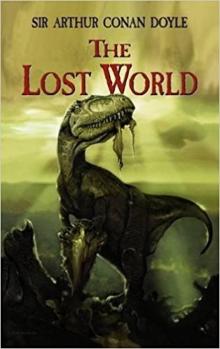 The Lost World
The Lost World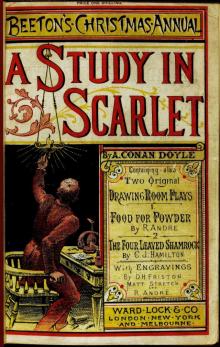 A Study in Scarlet
A Study in Scarlet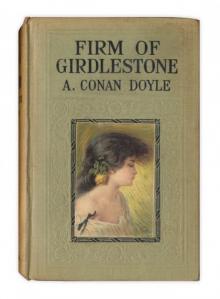 The Firm of Girdlestone
The Firm of Girdlestone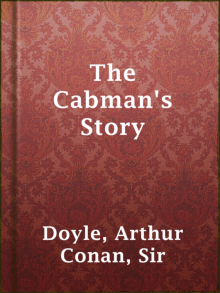 The Cabman's Story
The Cabman's Story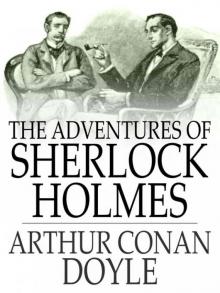 The Adventures of Sherlock Holmes
The Adventures of Sherlock Holmes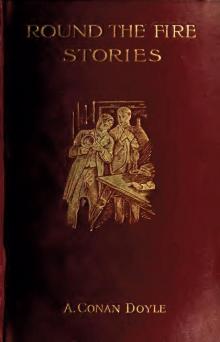 Round the Fire Stories
Round the Fire Stories His Last Bow: An Epilogue of Sherlock Holmes
His Last Bow: An Epilogue of Sherlock Holmes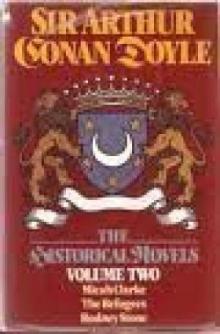 Micah Clarke
Micah Clarke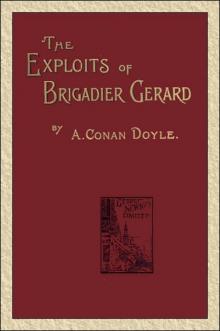 The Exploits of Brigadier Gerard
The Exploits of Brigadier Gerard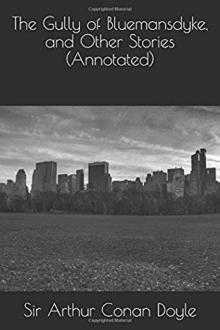 The Gully of Bluemansdyke, and Other stories
The Gully of Bluemansdyke, and Other stories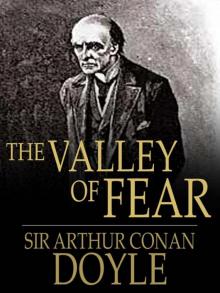 The Valley of Fear
The Valley of Fear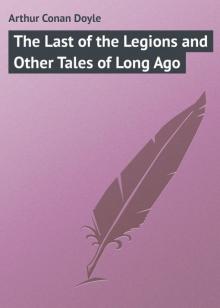 The Last of the Legions and Other Tales of Long Ago
The Last of the Legions and Other Tales of Long Ago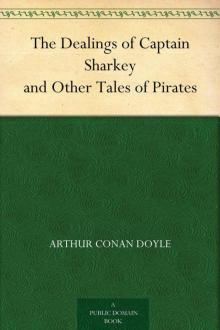 The Dealings of Captain Sharkey, and Other Tales of Pirates
The Dealings of Captain Sharkey, and Other Tales of Pirates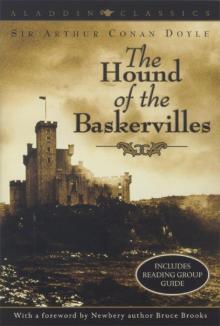 The Hound of the Baskervilles
The Hound of the Baskervilles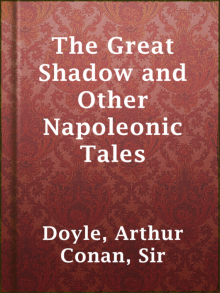 The Great Shadow and Other Napoleonic Tales
The Great Shadow and Other Napoleonic Tales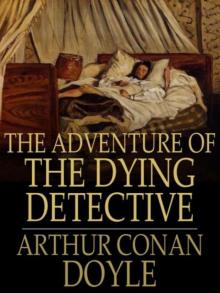 The Adventure of the Dying Detective
The Adventure of the Dying Detective The Man from Archangel, and Other Tales of Adventure
The Man from Archangel, and Other Tales of Adventure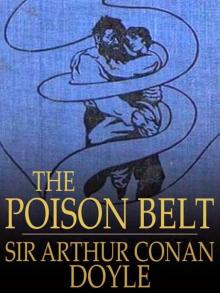 The Poison Belt
The Poison Belt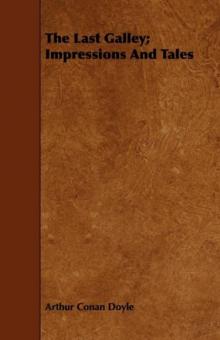 The Last Galley; Impressions and Tales
The Last Galley; Impressions and Tales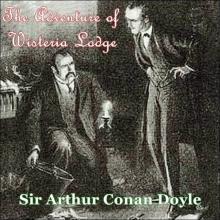 The Adventure of Wisteria Lodge
The Adventure of Wisteria Lodge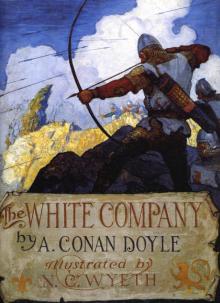 The White Company
The White Company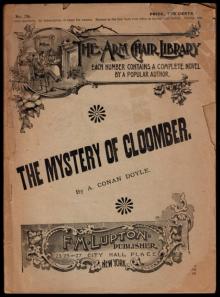 The Mystery of Cloomber
The Mystery of Cloomber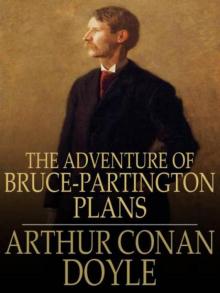 The Adventure of the Bruce-Partington Plans
The Adventure of the Bruce-Partington Plans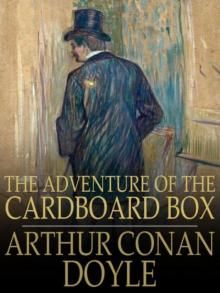 The Adventure of the Cardboard Box
The Adventure of the Cardboard Box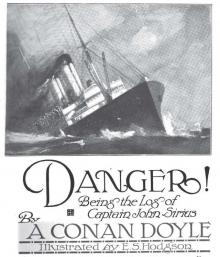 Danger! and Other Stories
Danger! and Other Stories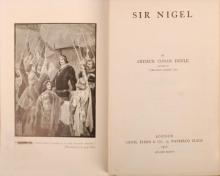 Sir Nigel
Sir Nigel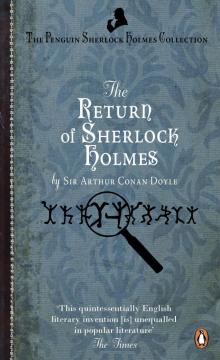 The Return of Sherlock Holmes
The Return of Sherlock Holmes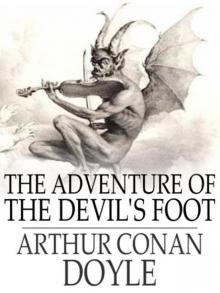 The Adventure of the Devil's Foot
The Adventure of the Devil's Foot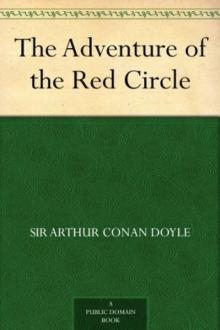 The Adventure of the Red Circle
The Adventure of the Red Circle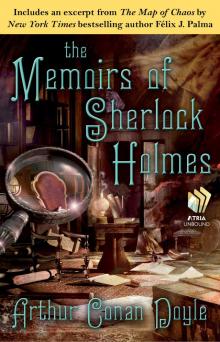 The Memoirs of Sherlock Holmes
The Memoirs of Sherlock Holmes The Adventure of the Yellow Face
The Adventure of the Yellow Face The Adventure of the Norwood Builder
The Adventure of the Norwood Builder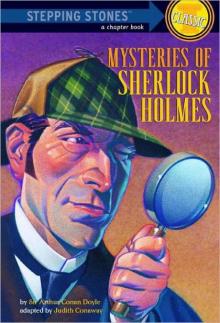 Mysteries of Sherlock Holmes
Mysteries of Sherlock Holmes The Adventure of the Missing Three-Quarter
The Adventure of the Missing Three-Quarter The Adventure of the Final Problem
The Adventure of the Final Problem A Scandal in Bohemia
A Scandal in Bohemia His Last Bow shssc-4
His Last Bow shssc-4 Beyond The City
Beyond The City The Adventure of the Gloria Scott
The Adventure of the Gloria Scott The Parasite
The Parasite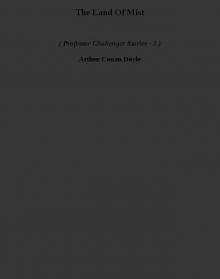 The Land Of Mist pcs-3
The Land Of Mist pcs-3 The Adventure of the Musgrave Ritual
The Adventure of the Musgrave Ritual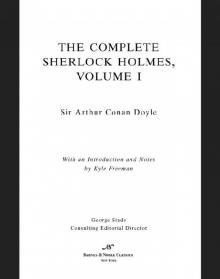 The Complete Sherlock Holmes, Volume I (Barnes & Noble Classics Series)
The Complete Sherlock Holmes, Volume I (Barnes & Noble Classics Series) The Adventure of the Stockbroker's Clerk
The Adventure of the Stockbroker's Clerk The Adventure of the Copper Beeches
The Adventure of the Copper Beeches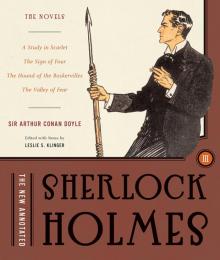 The New Annotated Sherlock Holmes
The New Annotated Sherlock Holmes When The World Screamed pcs-5
When The World Screamed pcs-5 The Adventure of the Six Napoleons
The Adventure of the Six Napoleons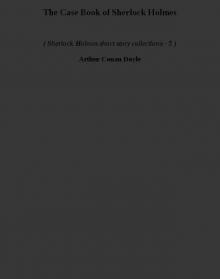 The Case Book of Sherlock Holmes shssc-5
The Case Book of Sherlock Holmes shssc-5 The Sign of Four
The Sign of Four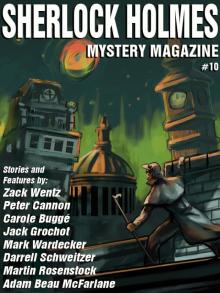 Sherlock Holmes Mystery Magazine #10
Sherlock Holmes Mystery Magazine #10 The Adventures of Brigadier Gerard
The Adventures of Brigadier Gerard The Adventure of the Second Stain
The Adventure of the Second Stain The Adventure of the Engineer's Thumb
The Adventure of the Engineer's Thumb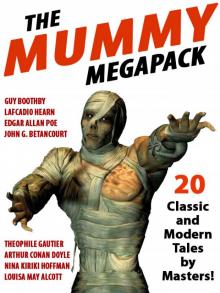 The Mummy Megapack
The Mummy Megapack The Disintegration Machine pcs-4
The Disintegration Machine pcs-4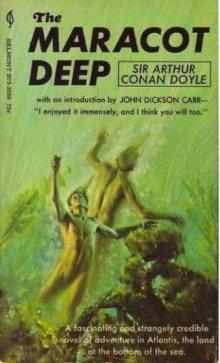 The Maracot Deep
The Maracot Deep The Five Orange Pips
The Five Orange Pips The Adventure of the Crooked Man
The Adventure of the Crooked Man The Adventure of the Blue Carbuncle
The Adventure of the Blue Carbuncle The Adventure of Silver Blaze
The Adventure of Silver Blaze The Adventure of the Solitary Cyclist
The Adventure of the Solitary Cyclist The Adventure of the Naval Treaty
The Adventure of the Naval Treaty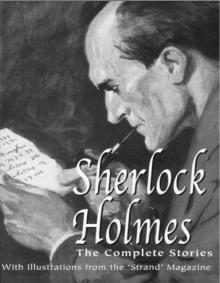 Sherlock Holmes. The Complete Stories
Sherlock Holmes. The Complete Stories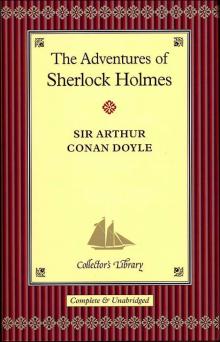 The Adventures of Sherlock Holmes (sherlock holmes)
The Adventures of Sherlock Holmes (sherlock holmes) The Adventure of the Empty House
The Adventure of the Empty House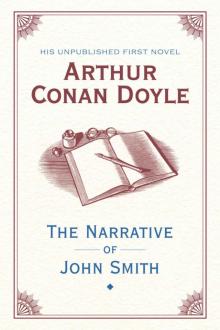 The Narrative of John Smith
The Narrative of John Smith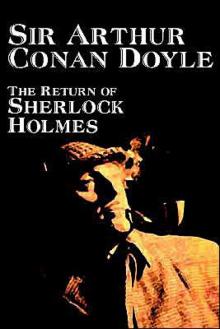 The Return of Sherlock Holmes (sherlock holmes)
The Return of Sherlock Holmes (sherlock holmes) The New Revelation
The New Revelation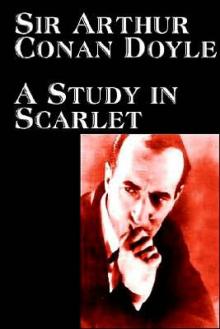 A Study in Scarlet (sherlock holmes)
A Study in Scarlet (sherlock holmes) The Vital Message
The Vital Message Sherlock Holmes Complete Collection
Sherlock Holmes Complete Collection Round the Red Lamp
Round the Red Lamp The Boscombe Valley Mystery
The Boscombe Valley Mystery The Adventure of the Beryl Coronet
The Adventure of the Beryl Coronet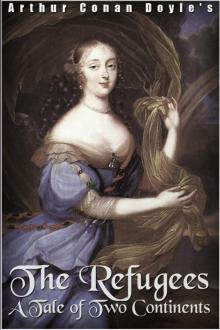 The Refugees
The Refugees The Adventure of the Three Students.
The Adventure of the Three Students.